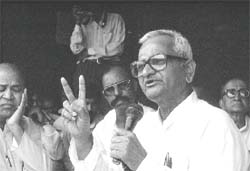
On track
The setting up of a task force may streamline and coordinate the various environment related activities of the UN

The setting up of a task force may streamline and coordinate the various environment related activities of the UN

Environmental stress has resulted mainly from unsustainable consumption levels in poor nations because of bad land use and degraded village commons and excessive use of non renewable resources in the developed countries. It is imperative that the global
Storage infrastructure and setting up processing facilities for our farm products are major issues and need immediate attention of policymakers to accelerate agricultural growth, says former power minister and MP, Suresh P Prabhu LACK of adequate infrastructure in the hinterland and poor connectivity are major reasons behind slow agricultural growth. Better communication infrastructure is urgently required to maximise benefits of scientific innovation in enhancing farm produce. Since there is a limit to expanding the farm land, I strongly believe that there is no alternative but to put together a credible agriculture infrastructure to meet the rising demand in India for foodgrains and other agri-products and also make decisive inroads into the external markets. Access to markets Beginning with physical road connectivity between the urban consumption markets to farmlands, setting up storage facilities to processing facilities for our farm products is one big issue that needs to be tackled by the policymakers in the country. Very often, I have witnessed heated debates in the Parliament on farmers' issues. Inadequate or lack of farm infrastructure is not limited to just India. It is a phenomenon in the entire South Asian region. Massive investments in building this infrastructure in agriculture and related farm-based industries are the only answer as we make efforts to maximise our productivity from the farmlands. Scientific research and technological innovations would make our investments more productive. Billions of dollars need to be set aside for laying rural roads, setting up cold storage, post-harvest processing units, quality and affordable inputs like seeds, fertilisers and water apart from undertaking massive diversification into horticulture, floriculture and allied areas like livestock, poultry development. Insulating Indian agriculture from vagaries of weather is another big challenge as the infrastructure for water storage, smooth flow up to farm-gate apart from ensuring judicious use needs emphatic focus. Only then the double-digit GDP growth envisaged during next five years would be possible. Common concern Farm infrastructure development assumes a lot of significance as the South Asian region led by India is home to 35% of the world's hungry and 40% of the world's poor. About 70% of these people belong to India. The country's borders with other South Asian countries are often porous for flow of agricultural inputs, products and human resources, but its formal trade, particularly its import with its neighbours, is not as intense. Authentic estimates corroborated by FAO figures project that the country's food production will exceed human food demand and sizeable surpluses of cereals, fruits and vegetables, potatoes and milk will be available, which will help strengthen the proposed South Asian Food Bank once the infrastructure bottlenecks are sorted out. As stated earlier, agricultural growth in recent years has thrown new sectors and regions into prominence. Livestock, fisheries, horticulture, specialty enterprises (spices, medicinal, aromatic, organic) and value-added products illustrate this trend. Market-driven diversification, emphasising the role of the private sector, in a global perspective, has become the new paradigm driving future agricultural growth. Alternative instruments and approaches are evolving to transform agriculture and a very important part of this

The ecology of the already shrinking Chilika lake is further threatened by the scramble among fisherfolk, farmers and traders to grabe their share of the depleting stock of fish and prawn.Meanwhile the state government too, oblivious of the lake"s deterio

Like all such meetings before, the UN World Summit in Copenhagen had to address the needs of the commoner, the bedrock of all nations

An Indian government report that criticises and asks for several amendments in the Montreal Protocol is expected to generate heated debate among signatories meeting later this month.
A study on polychlorinated biphenyls in Russia may throw up some startling findings

Complex systems of preserving biodiversity, evolved over centuries, have not saved traditional communities living in bio rich areas like India from poverty. Only if India starts patenting its germplasm can it compensate those of its communities which have

NGOs all over southern India are helping to revive the system of local medicinal plants and herbs, holding out the promise of not just cheaper and more effective healthcare for villagers, but also commercial profits

Militancy has destroyed much more than peace in Kashmir. Kalashnikov trotting extremists are ravaging the last green frontiers of the 'heaven on earth'. Even the Army is accused of active complicity. Eco vandalism has certainly emerged as a lucrative deal

Are the recent accidents at the Tarapur nuclear facility early warnings of a catastrophe in the making?

Kerala's backwaters are one of its most prized possessions. But they are fighting for survival today, with reclamation for the purposes of development and commerce increasingly choking them off

whereby farmers are led into dangerous territories

A quarter of a century ago, a jeep driver decided it was time to make a change. Ralegan Siddhi, made into a model village by Anna Hazare, faces challenges of a different kind today

Ten winters since methyl isocyanate exhaled history"s deadliest industrial disaster on Bhopal, action on toxicity remains agonisingly inadequate. India needs the technical knowledge of the Western world. Union Carbide recently made available its vast scie
While the buzz of e commerce has been accepted, the discordant noise of environment has been conveniently left out

There are both in Delhi criminal waste, unendurable want. And in this city of verdant veneers, nowhere does the callous politics of dispossession show its slip more than in the titanic economics of water. Water led the way to the formation of cities; th

India dithers on cleaner coal technologies. But it has the technology to help the thermal power sector clean up its act
Charged with illegal e waste disposal
<p><img alt="" src="http://indiaenvironmentportal.org.in/media/iep/homepage/msanwal_blog.jpg" style="width: 610px; height: 119px; margin: 14px;" />Technical examination and periodic assessmentswith respect